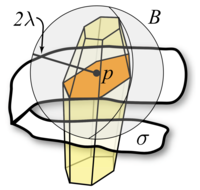Theory of a Practical Delaunay Meshing Algorithm for a Large Class of Domains

|
Recently a Delaunay refinement algorithm has been proposed that can mesh domains as general as piecewise smooth complexes. These domains include polyhedra, smooth and piecewise smooth surfaces, volumes enclosed by them, and above all non-manifold spaces. The algorithm is guaranteed to capture the input topology at the expense of four tests, some of which are computationally intensive and hard to implement. The goal of this paper is to present the theory that justifies a refinement algorithm with a single disk test in place of four tests of the previous algorithm. The algorithm is supplied with a resolution parameter that controls the level of refinement. We prove that, when the resolution is fine enough (this level is reached very fast in practice), the output mesh becomes homeomorphic to the input while preserving all input features. Moreover, regardless of the refinement level, each k-manifold element in the input complex ismeshed with a triangulated k-manifold. Boundary incidences among elements maintain the input structure. Implementation results reported in a companion paper corroborate our claims. |
[DOI/EE link]
@incollection{CDL08,
author = {Siu-Wing Cheng and Tamal K. Dey and Joshua A. Levine},
booktitle = {Statistical Science and Interdisciplinary Research -- Vol. 3: Algorithms, Architures and Information Systems Security},
editor = {B.B. Bhattacharya and S. {Sur-Kolay} and S.C. Nandy and A. Bagchi},
ee = {http://dx.doi.org/10.1142/9789812836243_0002},
month = {11},
pages = {25--42},
publisher = {World Scientific Press},
title = {Theory of a Practical {D}elaunay Meshing Algorithm for a Large Class of Domains},
year = {2008}
}